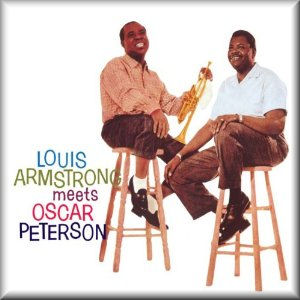1. That Old Feeling
2. Let's Fall In Love
3. I'll Never Be The Same
4. Blues In The Night
5. How Long Has This Been Going On?
6. I Was Doing All Right
7. What's New?
8. Moon Song
9. Just One Of Those Things
10. There's No You
11. You Go To My Head
12. Sweet Lorraine
13. Indiana
14. Let's Fall In Love (alternate version)
15. I Get A Kick Out Of You
16. Makin' Whoopee
17. Willow Weep For Me
18. Let's Do It
Louis Armstrong - Vocals, trumpet
Oscar Peterson - Piano
Herb Ellis - Guitar
Ray Brown - Bass
Louie Bellson - Drums
The impresario Norman Granz was an independent, unorthodox and vastly influential giant of jazz. Granz created the jam session concerts known as Jazz at the Philharmonic and was also the founder of Verve Records, along with Clef and Norgran which he folded into Verve. In this latter capacity, he brought together well-known jazz artists to record some of the seminal recordings of the mid-1950s until he sold the label to MGM. Granz's decision to match Louis Armstrong with the Oscar Peterson Trio plus Louie Bellson on drums produced this blue-chip session. Phoenix Records deserves a big thank you for this re-issue.
It is clear from the outset that this is an Armstrong outing, with Peterson and the band providing the unwavering support. At this point in their careers Armstrong was by far the better-known name, although Peterson had been recording for Granz's Clef label since 1949/1950, but was only one year removed from his biggest impact recording in 1956: The Oscar Peterson Trio at the Stratford Shakespearean Festival.
The format for this date with Louis was fairly predictable. Armstrong would lead off singing the tune's melody, to be followed by a couple of bars of his solo trumpet, then sing the closing verse, while the band provided melodic assistance in the background. The list of tunes was derived mostly from the Great American Songbook with a couple of ringers thrown in for good measure.
That Old Feeling kicks off the proceedings which is a mellow swinger, and then Let's Fall In Love wherein Louis offers a mid-tempo take on the vocal but then rips off a horn solo that is an octave higher than the sung melody. Better than almost anyone, Armstrong knows the blues and how to deliver a lyric and with Blues In The Night he covers some well-worn ground with Peterson at his stylish best in the background. A lovely George and Ira Gershwin tune I Was Doing All Right gives Louis a trumpet opener and then swings into another bluesy frame. With What's New, this is Armstrong and Peterson as a duo right through, with the other band members dropping out.
Moon Song is one of those oblique tunes that never received much attention from jazzmen, but has the structure to give Armstrong some space to make effective use of his horn. He does so with two strong choruses supported by the band. Bellson kicks everyone along with some inventive drumming. Using only guitarist Herb Ellis by his side, Louis performs the lovely ballad There's No You as a single stand-alone chorus. While Frank Sinatra may have the definitive version of You Go To My Head, Louis' take on the tune is compelling in its own way. He delivers the song with an entire chorus played on trumpet and followed by a vocal chorus.
There are six bonus tracks on this re-issue, starting with tracks 13 and 14 which were part of the original session and the other four which were recorded earlier in the year to be included in the LP Ella and Louis Again. Of these, the most interesting is Indiana which Louis recorded countless times as it was part of his standard repertoire. However here it appears to have been done as a sound-check track and never meant to be released. This is an instrumental version with everyone in full flight, whereby Peterson is allowed free reign to show off his dazzling piano technique which for the most part is kept under wraps in the released version of the album. Too bad.
This was the only occasion that Armstrong and Peterson worked together, but it demonstrated how wonderfully synergistic they were and thus makes this release all the more appealing.
Pierre Giroux
